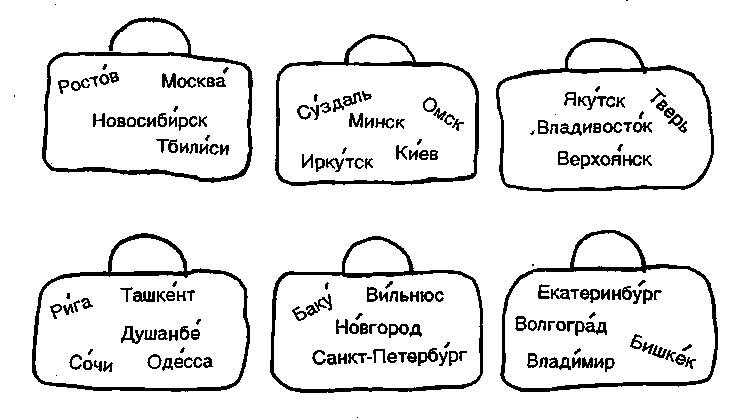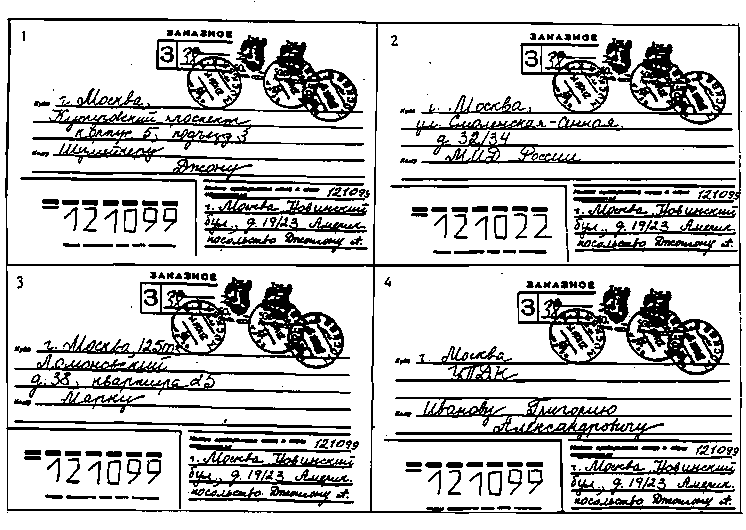A Russian and an American are talking about where they live.
Listen to the dialog several times with your books closed. Do not repeat it. Try to understand what the speakers are saying. Working as a group, discuss what was said. Then listen to the American's lines. You are responsible for learning these. You are also responsible for being able to understand the Russian's lines and to respond to them in the appropriate manner.
|
p. |
Ли́нда, я перее́хал на но́вую кварти́ру. |
Linda, I moved to a new apartment. |
|
A. |
Поздравля́ю! А где ва́ша но́вая кварти́ра? |
Congratulations! Where is your new apartment? |
|
P. |
Недалеко́ от ста́нции метро́ "Проспе́кт Ми́ра". |
Not far from the Metro Station "Prospect Mira". |
|
A. |
А како́й у вас а́дрес? |
What is your address? |
|
P. |
Проспе́кт Ми́ра дом 2, кварти́ра 5. |
2 Prospect Mira, apartment 5. |
|
A. |
Ка́тя, я перее́хал в но́вый дом. |
Katya, I moved to a new house. |
|
P. |
Поздравля́ю! А где ваш но́вый дом? |
Congratulations! Where is your new house? |
|
A. |
Далеко́, в но́вом райо́не в Роси́нке. |
It's far away, in a new district; in Rosinka. |
|
P. |
А како́й у вас а́дрес? |
What's your address? |
|
A. |
Роси́нка 720. |
720 Rosinka. |
|
P. |
Ли́нда, скажи́те пожа́луйста, где вы сейча́с живёте? |
Linda, please tell me, where are you living now? |
|
A. |
Сейча́с я живу́ в Роси́нке, недалеко́ от Москвы́. |
I live in Rosinka now, not far from Moscow. |
|
P. |
А где вы жи́ли в Аме́рике? |
And where did you live in America? |
|
A. |
Я жила́ в шта́те Мэриле́нд. |
I lived in Maryland. |
|
P. |
Вы жи́ли в до́ме или в кварти́ре? |
Did you live in a house or in an apartment? |
|
A. |
Я жила́ в до́ме. |
I lived in a house. |
|
p. |
Марк, скажи́те пожа́луйста, где вы сейча́с живёте? |
Mark, tell me please, where do you live now? |
|
A. |
Сейча́с я живу́ на Ле́нинском проспе́кте, недалеко́ от це́нтра го́рода. |
I live on Leninskiy Prospect now, not far from the center of the city (downtown). |
|
P. |
А где вы жи́ли в Аме́рике? Я жил в Нью-Йо́рке. |
And where did you live in America? I lived in New York. |
|
P. |
Вы жи́ли в до́ме или в кварти́ре? |
Did you live in a house or in an apartment? |
|
A. |
Я жил в кварти́ре. |
I lived in an apartment. |
Listen to the following questions and choose the appropriate answers from those given below.
Где ва́ша но́вая кварти́ра?
Како́й у вас а́дрес?
Где вы сейча́с живёте?
А где вы жи́ли в Аме́рике?
Вы жи́ли в кварти́ре или в до́ме?
a. Я жил в шта́те Мэ́риленд.
b. Сейча́с я живу́ в Роси́нке.
c. Проспе́кт Ми́ра дом 2, кварти́ра 5.
d. В до́ме.
e. Недалеко́ от стан́ции метро́ «Проспе́кт Ми́ра».
a. Answer the following question, using the model:
-Где вы сейча́с живёте?
-Сейча́с я живу́ в Москве́.
1.
Алма́-А́та
6. Екатеринбу́рг
2.
Ри́га
7. Владивосто́к
3.
Ки́ев
8. Ташке́нт
4.
Ерева́н
9. Петербу́рг
5.
Минск
10. Тбили́си
b. Answer the following question, using the model:
-А где вы жи́ли в Аме́рике? (В како́м шта́те?)
-В Аме́рике я жил(а́) в Нью-Йо́рке.
1.
Мэ́риленд
6. Флори́да
2.
Вашингто́н
7. Нева́да
3.
Теха́с
8. Монта́на
4.
Мичига́н
9. А́йова
5.
Мэн
10. Индиа́на
Translate the following into Russian:
Where do you live?
I live in Moscow?
Where did you live?
I lived in America.
What's your address?
Washington is a beautiful city.
New York is a big city.
Congratulations!
Do you live in a house or an apartment? 10.1 live in an apartment.
With your instructor playing the role of the Russian, act out the dialogs. At first adhere closely to the original. Then use as many variations as possible.
Listen and repeat as the numbers from 20-100 are read on the tape.
| 20 | два́дцать | 30 | три́дцать | 40 | со́рок | 50 | пятьдеся́т |
| 60 | шестьдеся́т | 70 | се́мьдесят | 80 | во́семьдесят | 90 | девяно́сто |
| 100 | сто |
Your instructor will count by tens from 20 to 100 a number of times. Each time he/she will skip a number. Which one was it?
Listen and follow along in your books as the following series of numbers are read on the tape. Now listen again, with your books closed. Repeat after the speaker:
a. 100--50--20--40-30-60--90--70
b. 70--90--60--30--40-20-50--100
с. 40-20-30--10- 50--70--90-60
d. Look at the pictures and count.
 |
Using the list of addresses given here, act out one of the dialogs with your instructor.
Америка́нское посо́льство, Нови́нский бульва́р 19/23
Ул. Больша́я Орды́нка 50
Донска́я ул. 18/7
Куту́зовский проспе́кт 7/4, ко́рпус 2
Крути́цкий вал 3, ко́рпус 2
Ле́нинский проспе́кт 93, ко́рпус 2, подъе́зд 3
Ломоно́совский проспе́кт 38
Серпухо́вский вал 8
Ул. Вави́лова 83
Your instructor will read several Moscow addresses aloud. Write them down in English and then find them on a map of Moscow. Now listen again as your instructor reads the list once more. This time write down the addresses in Russian.
Look at the picture and tell which cities Ива́н Ива́нович and his wife Варва́ра Петро́вна (the owners of these suitcases) have visited. Use the model:
Они́ бы́ли в Росто́ве.
Они́ бы́ли в Оде́ссе.
 |
While on vacation, you made a number of new friends. Did you remember to get their addresses? Good! Read them aloud, telling your classmates where each of them lives by using the model:
| Э́то мой знако́мый Ива́н | Он живёт в Москве́. |
| Э́то моя́ знако́мая Мари́я. | Она́ живёт в Ки́еве. |
|
1. |
Ива́н |
Москва́ Тверско́й бульва́р 10, кварти́ра 15 |
|
2. |
Никола́й |
Ташке́нт ул. Дру́жбы 19, кварти́ра 20 |
|
3. |
Алекса́ндр |
Санкт-Петербу́рг Не́вский проспе́кт 22, кварти́ра 15 |
|
4. |
Григо́рий |
Кострома́ ул. Ма́лая Садо́вая 9, кварти́ра 10 |
|
5. |
Мари́я |
Ки́ев ул. Богаты́рская 4, кварти́ра 55 |
|
6. |
Ната́ша |
Минск Ры́бный переу́лок 30, кварти́ра 2 |
|
7. |
О́льга |
Бишке́к Большо́й Козло́вский проспе́кт 12, кварти́ра 49 |
While in Moscow, you mailed several business and personal letters. They were returned to you because you made mistakes in addressing them. Take a look at the envelopes, find your mistakes and correct them.
 |
Choose the most appropriate answers to the following questions:
|
1. |
Где вы живёте? |
|
|
2. |
В како́м го́роде вы жи́ли? |
|
|
3. |
Како́й у вас дом? |
|
|
4. |
Что есть на ва́шей у́лице? |
|
You've found a lost child (played by your instructor). Ask his/her name, where he/she lives, etc. Recall that you should address the child as «ты». Relate that information to the militiaman (played by your instructor, whom you'll address as «вы») who has come to help.
Ask various instructors in the Russian Section where they live now and where they used to live in the Former Soviet Union. Remember that you'll be addressing them as «вы». Come back and tell your classmates what you found out. Use the models given here:
Скажи́те, пожа́луйста, где вы сейча́с живёте?
А где вы ра́ньше жи́ли?